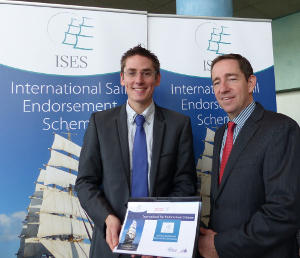Launch of International Sail Endorsement Scheme
This is a new international qualification aimed at raising the professional standards and supporting the professional development of those who sail tall ships.

PRESS RELEASE
New International Sail Endorsement Scheme launched by The Nautical Institute and Sail Training International
A new international qualification aimed at raising the professional standards and supporting the professional development of tall ship sailors has been launched.
The International Sail Endorsement Scheme (ISES) is the result of two years work by experts from Sail Training International (STI) and The Nautical Institute (NI). It was launched at STI’s annual meeting in A Coruña, Spain.
“The aim of the scheme is to establish, promote and recognise a high standard of knowledge, understanding and proficiency among those who sail tall ships,” said Steven Gosling, Training and Quality Manager at the Institute. “The scheme marks the creation of the first international proficiency standard against which square rig and fore-and-aft sailors can be independently assessed and endorsed.”
Doug Prothero, Executive Chairman of Sail Training International, said: “Sail Training International is continually working with the global fleet of tall ship operators and their respective national sail training organisations to raise the bar on safety at sea in sail training vessels. This joint venture with The Nautical Institute marks not only an important new tool for the industry and those who regulate them but we feel it has also set STI on a new course that will include other projects with the NI.”
A group of tall ship experts from all over the world, many of whom are serving Masters, has put together the scheme. “This group understands the unique challenges of managing and operating these vessels safely and efficiently,” said Mr Gosling. “This is a scheme devised by the tall ship sailor for the tall ship sailor.”
An appeal went out to members of the tall ship community to give their feedback on the scheme to ensure it remains relevant and reflects the practices, techniques and traditions that shape the science and art of tall ship sailing.
“The Institute and STI have long recognised that people who sail tall ships require specialist skills and knowledge to do their job safely and proficiently,” added Mr Gosling. “What has always been missing, however, is an international framework setting out what the sailor should know and be able to do to become proficient in the operation of fore and aft and square rig vessels.
“With ISES, tall ship sailors will understand what the industry deems they should be capable of when standing watch on ship. It will also enable them to meet a recognised industry standard and be awarded an industry developed endorsement.”
The scheme also provides owners, operators and Flag States the opportunity to raise professional standards in this specialist sector by aligning national schemes with those prescribed by the industry.
For more information please see: http://www.nautinst.org/ises
Ends
Editor’s note:
Sail Training International works for the development and education of young people through the sail training experience, regardless of nationality, culture, religion, gender or social background. Its membership and activities are international.
It achieves its purpose through a range of activities and services, including: conferences and seminars; races and other events for sail training Tall Ships; publications and DVD presentations; international research; the Class A Tall Ships Forum, whose members are the operators of about 70 of the world’s largest square-rigged sail training vessels; the Sail Training International Youth, whose members are under the age of 26 and represent the interests of young sail trainers around the world.
For more information see: http://www.sailtraininginternational.org
The Nautical Institute is the international professional body for qualified seafarers and others with an interest in nautical matters. It provides a wide range of services to enhance the professional standing and knowledge of members who are drawn from all sectors of the maritime world. Founded in 1972, it has over 40 branches worldwide and some 7,000 members in over 110 countries.
The Nautical Institute is a non-governmental organisation (NGO) with consultative status at the International Maritime Organization (IMO). Its aim is to represent seafarers' and practical maritime professionals' views at the highest level.
As a representative body, the Institute fulfils its role in many different ways. Membership by proven qualifications and experience helps to set standards. The technical committees ensure that professional opinion and advice is fed back to the industry’s decision making bodies. Publications written by practitioners for practitioners provide the best operational guidance available and the branches encourage professional development in local areas.
For more information see: http://www.nautinst.org
Please note: The Nautical Institute takes a capital T on The
